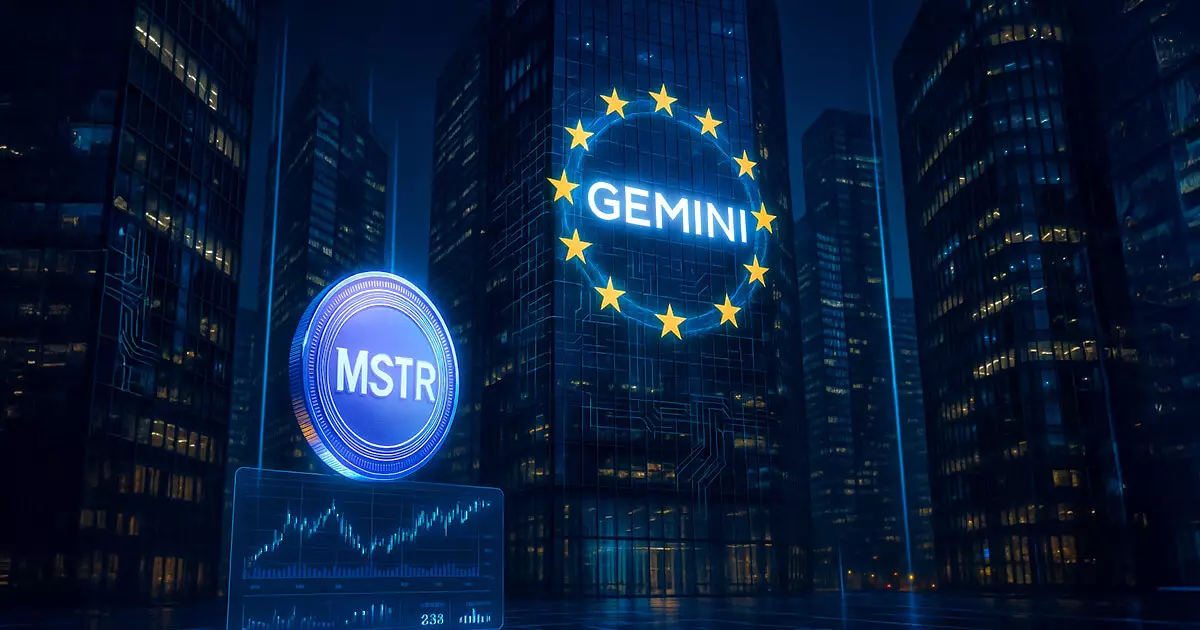Gemini’s recent introduction of tokenized Strategy (MSTR) shares marks more than a technological experiment—it signals a bold step toward reshaping how global investors interact with U.S. equities. By leveraging blockchain infrastructure via a partnership with Dinari, Gemini offers European users access to fractional, on-chain shares. This innovation transcends traditional barriers: investors no longer need to navigate cumbersome brokerage systems or contend with prohibitive currency exchange fees. The so-called “wall” separating global retail investors from prominent U.S. stock markets begins to crack here, empowering anyone with a smartphone to trade 24/7 with unprecedented liquidity.
This initiative aligns neatly with center-right ideals of expanding market participation through innovation while maintaining compliance. Gemini’s focus on “compliance-focused jurisdictions” reassures skeptics that blockchain adoption need not abandon legal and regulatory norms in favor of wild west speculation. Company executives’ vision to “export U.S. equities across the globe” is not utopian—it is a practical step toward a freer, more efficient capital market.
The Real Value and Risks Behind Tokenized Stocks
Tokenized securities promise alluring benefits: fractional ownership allows investors with modest capital to diversify; seamless, on-chain settlement reduces intermediary frictions; and blockchain’s transparency should theoretically heighten trust. Yet one must remain critically vigilant. For all its appeal, tokenization introduces newer, less tested risks stemming from technological vulnerabilities and regulatory ambiguities. While Gemini claims tokenized stocks carry the “same economic rights” as underlying shares “where permitted,” these legal intricacies remain fluid, especially across international borders.
Moreover, the decision to launch initially on Arbitrum, a layer-2 Ethereum network, hints at scalability ambitions but also exposes tokens to risks inherent to newer blockchain ecosystems—smart contract bugs, platform outages, or governance conflicts. The sustainable long-term impact depends heavily on whether regulators worldwide will clarify treatment of these hybrid assets without stifling innovation. Gemini’s conservative approach is prudent, but tokenized equities are far from a regulatory fait accompli.
A Modernizing Force That Strikes a Balancing Act
Gemini’s strategy encapsulates an essential tension in modern finance: how to merge the democratizing potential of Web3 technologies with existing financial frameworks built on decades of legal precedent, market oversight, and investor protections. This is where Gemini’s role as a regulated exchange matters. Unlike fringe crypto projects promising decentralized utopias, Gemini operates within a compliance-first model, which resonates with liberal center-right principles: progress through innovation—but responsibly so.
If successful, Gemini’s efforts could invigorate traditional markets by injecting fresh liquidity and participation, especially from demographics historically sidelined by brokerage fees or bureaucratic inefficiency. They could pressure legacy players to innovate for once rather than protecting entrenched interests. Yet this progress must be measured against fundamental concerns of investor safety, market integrity, and long-term regulatory clarity.
The Power and Pitfalls of 24/7 Accessibility
One of the standout promises in Gemini’s announcement is 24/7 accessibility to tokenized stocks. While conventional stock exchanges operate mostly during business hours, the blockchain model enables constant trading. For global investors, this is tempting—no longer forced to time trades to New York hours or coordinate across time zones.
But such perpetual markets can also exacerbate risk-taking behaviors and market volatility. Without pauses to digest information or consider broader economic contexts, investors can fall prey to emotional and impulsive decisions. The democratization of access must come paired with increased investor education and robust safeguards; otherwise, it risks becoming a gateway to reckless speculation disguised as innovation.
Gemini’s rollout of tokenized MSTR shares is neither a naive leap nor a cynical marketing stunt—it is a calculated gambit that blends promising technology with measured regulatory compliance. From a center-right liberal viewpoint, this experiment represents an important step toward empowering individual investors while respecting legal frameworks that safeguard market stability. It is emblematic of how finance should evolve in the digital age: embracing innovation to expand opportunity, yet grounded in responsibility.
Whether tokenized stocks will upend traditional brokerage models remains to be seen, as regulatory crackdowns or market skepticism could pose substantial hurdles. Nonetheless, Gemini’s pioneering effort highlights the tangible possibilities—financial inclusion, frictionless transactions, and global access—when blockchain is harnessed wisely. As the experiment unfolds, investors and regulators alike must proceed with eyes wide open, balancing enthusiasm with prudence.



















Leave a Reply